Turkey’s Elections
Don't get your hopes up.
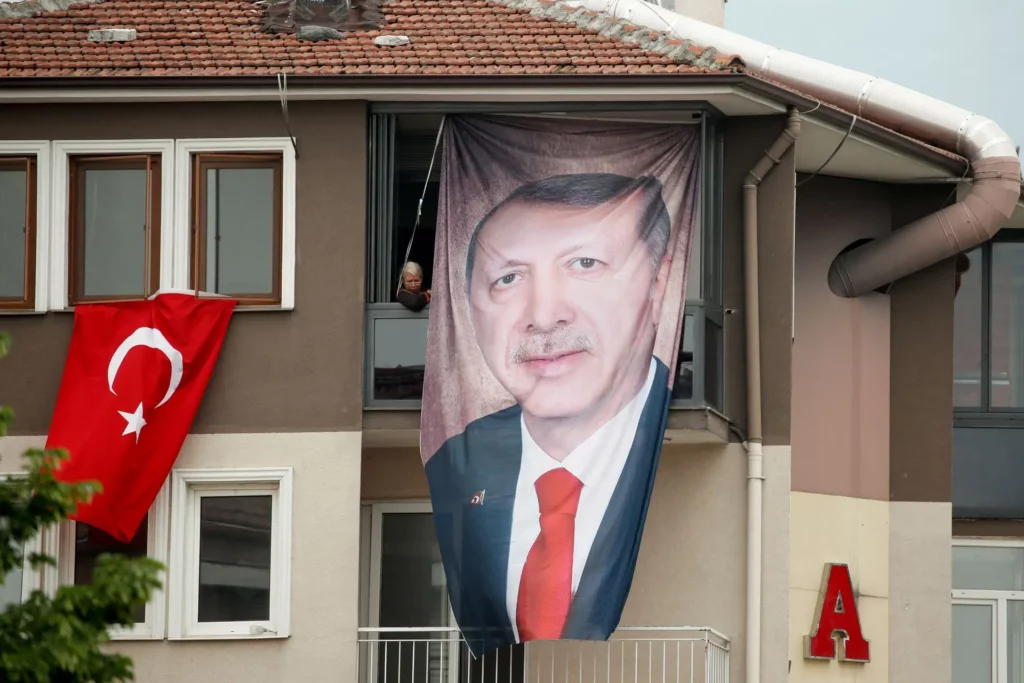
The withdrawal of a major opposition candidate ahead of the weekend election has given hope that Tayyip Erdogan’s two-decade run as Turkey’s chief executive could be over.
Reuters (“Erdogan’s rival boosted by withdrawal, poll lead ahead of Turkey vote“):
The man challenging Tayyip Erdogan in Turkey’s presidential elections this weekend received a boost on Thursday when a small party candidate abruptly withdrew and a closely-watched poll gave him a more than five percentage point advantage.
The withdrawal by Muharrem Ince, one of four contesting Sunday’s presidential vote, could reshape the last days of campaigning in what is seen as Erdogan’s biggest test in his two-decade reign.
Turkey’s main stock index jumped 6% after Ince made the shock announcement in front of his party’s headquarters in Ankara. Financial markets are on edge given Kemal Kilicdaroglu has pledged to reverse Erdogan’s unorthodox economic policies.
Turkey’s sovereign dollar bonds rallied with longer-dated issues rising as much as 2.5 cents in the dollar to change hands at over 82 cents – levels last seen more than a year ago.
The survey by pollster Konda put support for Erdogan on 43.7% and Kilicdaroglu on 49.3%, leaving him short of the majority needed to win in the first round and suggesting the election would go to a run-off between the two men on May 28.
The survey was carried out May 6-7, before Ince’s announcement. “The possibility of Kemal Kilicdaroglu winning has increased with Ince’s withdrawal. I would not be surprised if he got 51%,” said Bekir Agirdir, manager of Konda, speaking on news website T24 after the announcement.
The findings in the Konda poll were largely in line with some other surveys that put Kilicdaroglu ahead. He was named candidate of a six-party opposition alliance and also heads the Republican People’s Party (CHP), the banner under which Ince unsuccessfully ran for president in 2018.
Erdogan’s re-election bid has been complicated by a cost-of-living crisis, triggered by a lira slump and soaring inflation, and a devastating earthquake in February which killed more than 50,000 people in Turkey and left millions homeless.
Some are giddy as to what that means for Turkey’s relationship with the West.
Telegraph defense editor Con Coughlin (“Nato has an enemy within, and he’s heading for a fall“):
When Turks go to the polls at the weekend, they will not only be determining the future course of their country’s political development. They will be deciding whether Ankara can maintain its position as a vital pivot of the Western alliance.
With the Turkish economy in meltdown and the country still struggling to come to terms with February’s devastating earthquake, opposition parties believe they have a rare opportunity to oust Recep Tayyip Erdoğan, the country’s authoritarian leader.
Once hailed as a pro-business moderniser who would forge closer ties with Europe – including Turkey joining the EU – the 69-year-old Turkish president’s two decades in power have seen him adopt an increasingly autocratic approach to governing his country’s affairs, one that has acquired a distinctly Islamist outlook.
This has led to questions being raised among Western leaders about Turkey’s continued reliability as a Nato ally.
Tensions first emerged over Ankara’s support for al-Qaeda-linked Islamist groups during the Syrian civil war, and intensified when Erdoğan was blamed for causing the mass migration of Syrian refugees into southern Europe.
These were compounded when Turkey signed an arms deal in 2017 with Moscow to buy Russia’s state-of-the-art S-400 anti-aircraft missile system, which was specifically designed to shoot down Nato warplanes. The US responded by excluding Ankara from the F-35 stealth fighter programme and imposing sanctions. More recently, Turkey has frustrated Nato leaders with its spurious objections to Sweden joining the alliance.
It is arguably only by dint of Turkey’s strategically vital location on Nato’s south-eastern flank that it has managed to retain its membership. Consequently, many Nato leaders will be desperately hoping, along with tens of millions of Turks, that Sunday’s presidential and parliamentary elections will result in Erdoğan being ejected from power.
The ballot is certainly one of the closest contests Turkey has witnessed in recent years, with the latest polls indicating that opposition leader Kemal Kılıçdaroğlu, who is backed by a six-party alliance, enjoys a slight advantage over Erdoğan. Support for Kılıçdaroğlu, a 74-year-old former accountant who heads the Republican People’s party, has been building steadily over his commitment to dismantling the oppressive authoritarian system established by Erdoğan as he and his allies in the Justice and Development Party (AKP) have set about destroying the secularist constitutional framework established by Kemal Atatürk, the founder of modern Turkey.
Kılıçdaroğlu’s pledge to scrap Erdoğan’s presidential system by re-establishing the powers of parliament and the office of prime minister, as well as guaranteeing the independence of the judiciary and the press, have particularly struck a chord with young Turks. Many of them yearn for relief from Turkey’s parlous economic plight – inflation is currently running at around 45 per cent – and state-sponsored repression.
As Kılıçdaroğlu remarked in a recent BBC interview: “The youth want democracy, they don’t want the police to come to their doors early in the morning just because they tweeted. I am telling young people they can criticise me freely. I will make sure they have this right.”
Beyond Turkey, Western leaders have taken a keen interest in Kılıçdaroğlu’s commitment to reaffirming his country’s Nato credentials, pledging to repair relations with the US. There has even been talk of resurrecting Ankara’s long-dormant bid to join the EU.
While I would absolutely love to see Erdogan replaced by someone more democratically-minded and aligned with the West, other observers are more skeptical than Coughlin.
Guardian diplomatic editor Patrick Wintour (“Turkish election may not bring the geopolitical shift some are hoping for“):
Few elections, save the US presidential contest, have been so closely watched for their geopolitical implications in modern times as the Turkish presidential elections, a testimony to the importance of Turkey globally as a hinge country between east and west, as well as one teetering between democracy and populist authoritarianism.
But the distinctions being drawn between the foreign policy of the incumbent president, Recep Tayyip Erdoğan, and challenger, Kemal Kılıçdaroğlu, are less a substantial reinterpretation of the Turkish national interest, more about the style, tone and predictability in securing that interest.
But tone matters in diplomacy, and the west would welcome an end to the era of confrontational rhetoric, even if the policy of balancing between east and west remains.
An early indication would be if Kılıçdaroğlu – the candidate of a six-party opposition – lifted Turkey’s veto on Swedish Nato membership, possibly as early as the Nato summit in Vilnius in June. There are already signs that, with Finland now permitted entry by the Turks, Erdoğan himself knows the benefit of continuing to veto Sweden over what it claims – and Sweden denies – is the harbouring of Kurdish terrorists will soon have served its electoral purpose.
But Nato would also welcome a restoration of the prestige of the Turkish ministry of foreign affairs – as promised by the opposition – so western diplomats are less prone to being blindsided by Erdoğan’s kind of mercurial negotiating tactics over Nato, or indeed over Greece, Libya and Cyprus. A more institutionalised foreign policy may also make it less transactional.
Kılıçdaroğlu, facing huge domestic economic problems, has indicated he would like to shed the anti-US rhetoric and return to parliamentary democracy as a route to reopening EU accession talks. “We reject the confrontational style of the current government,” said Ünal Çeviköz, the chief foreign policy adviser. “We want a Turkey that is perceived as a like-minded member of the western states community.”
But the small print reveals some of the policy distinctions are more blurred than the headline. Çeviköz, for instance, says Erdoğan’s purchase of the Russian S-400 missile defence system in 2017 was “a big mistake and we paid dearly for it”, a reference to the US subsequently pushing Turkey out of the joint F-35 fifth-generation fighter jet programme, as well as from the purchase of F-16s. But he stops short of giving up the Russian weapons system.
Optimists hope that if Erdoğan is re-elected, the pervasive anti-American conspiracy theories he purveys will be shown to be just to shore up his nationalist vote. But anti-Americanism has been fed for a long time by the Turkish president. When the US ambassador to Turkey, Jeff Flake, met the opposition in March, a quite normal diplomatic exchange, Erdoğan vowed to “teach the Americans a lesson” and accused the west of tampering with the Turkish elections. He said: “They say they are against Erdoğan, but hostility towards me is hostility towards my people – and my people will thwart this plot.” The interior minister, Süleyman Soylu, has claimed Çeviköz is a US agent who reports to Washington on the Cyprus question.
Cihan Tugal, Berkeley sociology professor, NYT (“Whatever Happens Next, Turkey Is in Trouble“):
The Turkish opposition has never been as hopeful as it is today. Despite the many difficulties of the past two decades, never have so many factors lined up against President Recep Tayyip Erdogan and his Justice and Development Party, or A.K.P.
[…]
But any euphoria is premature. If the opposition were to prevail, it would face the same structural problems that have stymied the country for years — and even if Mr. Erdogan is dethroned, his political project is going nowhere. That should be enough to curb unbridled enthusiasm. Turkey may soon be rid of its autocratic leader, but it remains in deep trouble.
One of the most common words the opposition uses is “restoration.” The six parties that constitute the coalition do not agree on everything, but there are strong indications of what they want to restore. Two of the opposition parties are headed by high-profile former members of the A.K.P. One of them, Ali Babacan, devised the party’s earlier economic policies. The other, Ahmet Davutoglu, is widely credited with its approach to foreign policy. Under these two figures, the A.K.P. in the 2000s deepened and popularized the country’s market-friendly and pro-Western orientation.
But a return to this approach is simply not possible in the 2020s. Economically, the global climate is far less favorable to the kind of free market economics, relying on foreign direct investment, high interest rates and trade liberalization, of the A.K.P.’s first decade in power. Geopolitically, the European Union’s stance on Turkey’s accession has changed — more or less ruling it out — and in the wider region, American military and diplomatic hegemony can no longer be counted on.
The government already knew as much. The shift away from Mr. Babacan’s market-friendly policies was effectively enforced by a contraction in world markets a decade ago. On the international relations front, a primary reason for Mr. Davutoglu’s resignation as prime minister in 2016 was that the governing party no longer found a pro-Western approach to be profitable. With Russian and Chinese influence in the region growing, the A.K.P. decided to hedge its bets, without abandoning its Western allies completely.
In recent years, the A.K.P. pragmatically resorted to a number of tools to manage the economy. It didn’t always go well. Yet despite the party’s blunders, what allowed the A.K.P. to hang on to power was a wide and sturdy popular base of support. That base was built through five decades of work that melded face-to-face interaction and informal ties — helping people organize community events, for example, or acting as mediators in neighborhood conflicts — with formal party and associational membership. In power, the shaky but real benefits of the A.K.P.’s ever-shifting mix and match of market-oriented and statist policies cemented these ties with the people.
One reason behind the A.K.P.’s persistent appeal is that — with the exception of the Kurdish movement and its small socialist allies — no political force in the country has tried to build such a widespread rapport with communities. Without a clear alternative to the status quo, many people will stick with the political leadership they know. The recent promises of redistribution made by Kemal Kilicdaroglu, the presidential challenger to Mr. Erdogan and the leader of the Republican People’s Party, are hardly enough to break the A.K.P.’s stranglehold on society.
Instead, the mainstream parties are stuck with conventional wisdom. They count on resuscitating foreign direct investment, despite its global decline, and are highly critical of the A.K.P.’s huge state-led projects, such as the manufacturing of cars and ships. But if the opposition is going to scratch such “national economy” policies, what is it going to replace them with? The lack of a convincing answer to this question acts as a caution about what is to come.
Yet voting out Mr. Erdogan would still be a great relief. In over two decades at the helm, he has concentrated power in his own hands, imprisoning opponents and stifling the courts. In recent years, as the economy worsened, the A.K.P. under him has been ratcheting up its religious and ethnic agenda, opening its arms to anti-women and pro-violence fringe groups. Defeating this hard right turn, and striking a blow against authoritarianism, is crucial.
WaPo’s Claire Parker asks the obvious question: “Will Turkey’s elections be free and fair?“
Facing an unusually unified opposition, Erdogan is vulnerable. Still, he has imprisoned critics and essentially controls the Turkish media — and U.S.-based watchdog organization Freedom House ranks Turkey as “not free.”
Analysts say the vote will test whether elections still provide a viable means of political contestation in Turkey, or whether they will become a facade to justify an autocratic president’s enduring grip.
[…]
While allegations of fraud have marred previous votes, elections are still free in that opposition candidates are permitted to run — and despite the erosion of democracy under Erdogan, Turkish civil society has maintained a rich tradition of election monitoring, Tahiroglu said.
“I do think it still could be a free election,” she said. “And by that I mean that on the day of May 14 when people vote, that those votes will, by and large, count, and the results will be, by and large, correct.”
That’s because groups including Turkey’s oldest election monitoring organization, Vote and Beyond, send out tens of thousands of volunteers to polling stations across the country to monitor the vote, including the official count.
“Because the stakes are so high, they’re mobilizing at a level I’ve never seen before,” Tahiroglu said.
Still, concerns remain. If they lose, Erdogan and the AKP could refuse to accept the results. In late April, Turkey’s interior minister appeared to lay the groundwork for such an outcome, warning of a “political coup attempt” backed by the United States.
A delegation from the Parliamentary Assembly of the Council of Europe, which visited Ankara last month, raised concerns about the logistics of voting in areas devastated by the February earthquakes.
The body is sending a 33-member delegation to Turkey to observe the voting along with other international monitors.
Even if the voting process itself is secure, which would mean a free election in a narrow sense, the vote is unlikely to be fair, analysts say.
Freedom House gives Turkey a score of 2 out of 4 for the fairness of its elections, citing criticism of the 2018 general elections by the Organization for Security and Cooperation in Europe, which accused the AKP of misusing state resources to gain electoral advantage and Erdogan of falsely portraying political opponents as supporters of terrorism.
“The judges of the Supreme Electoral Council (YSK), who oversee all voting procedures, are appointed by AKP-dominated judicial bodies and often defer to the AKP,” the Freedom House report finds.
Ahead of the election, Erdogan has turned to his tried-and-true tactic of stoking culture wars. And he has deployed massive public spending this year — offering tax relief, cheap loans and energy subsidies — to woo voters.
Erdogan’s tight control over the media has tipped the public narrative in his favor. And under his rule, the judiciary has jailed or brought charges against critics — including Istanbul’s popular mayor, Ekrem Imamoglu, who is from Kilicdaroglu’s party. Imamoglu was convicted in December of insulting state institutions in a case widely seen as politically motivated. He has appealed the verdict.
Last Sunday, protesters disrupted a rally Imamoglu was holding on Kilicdaroglu’s behalf in eastern Turkey, pelting rocks at his campaign bus.
Turkish authorities also arrested more than 100 people in a sweeping operation focused on the Kurdish city of Diyarbakir last month, alleging they had ties to the banned Kurdistan Workers’ Party (PKK) militant group.
Politicians, lawyers and journalists were among those detained. Pro-Kurdish politicians described the detentions as politically motivated.
“Given how much control Erdogan has over the judiciary, the bureaucracy, the media and other state institutions, it’s impossible for this to be a fair playing field,” Tahiroglu said.
That doesn’t mean the opposition can’t win. Major opposition parties of disparate ideological backgrounds have rallied behind Kilicdaroglu, who has sought to circumvent media bias by publishing videos filmed in his modest kitchen to social media.
That’s not exactly reassuring. Opposition leaders will have to overcome violence, systemic repression, and the fear that the election will be stolen from them. Essentially, they’ll need to win by a sufficiently large margin that it can’t be stolen.

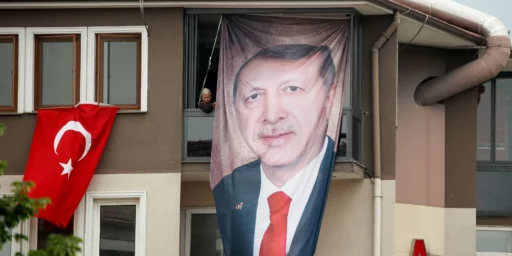
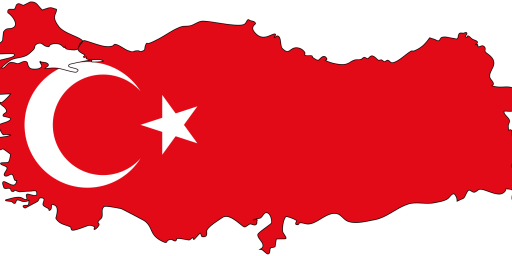
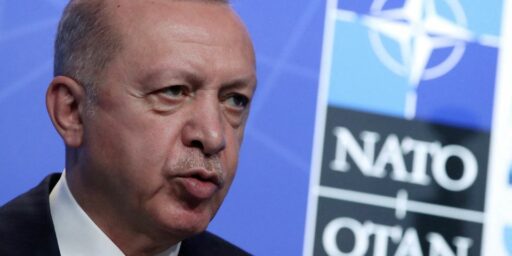
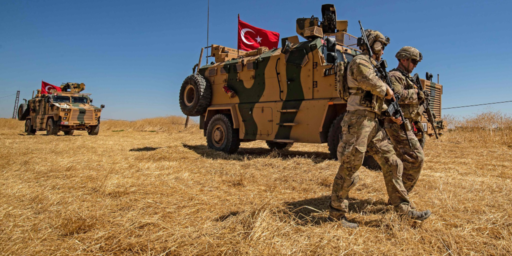
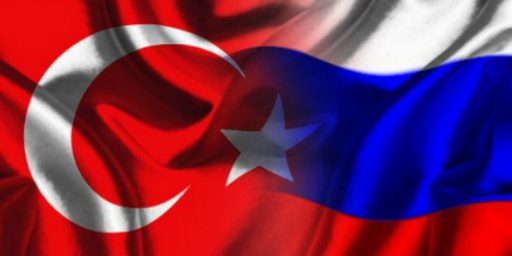
Much like Democrats in Arizona, Pennsylvania, Wisconsin, Georgia. . . But, Jesus H: Kılıçdaroğlu? We have to learn how to pronounce and spell that? And do we have to use ‘1’ instead of ‘i’?
Pity Turkey has such excellent geography. Makes them kind of hard to dismiss.
During our recent trip, our guides in both Kusadasi and Istanbul were vehemently anti-Erdogan. May their tribe increase.
A subject near and dear to my heart given certain familial connexions.
Inflation and the eccentric Turkish response of not responding with interest rate rises to the inflation crisis (thanks to Erdogan firing the proper Central Bank governor and replacing with family crony) [in a sourly amusing factor, what Erdogan has imposed actually rather resembles what certain innumerate quarters of the US ‘progressive Left’ desire(d) in re response to inflation]
With sustained inflation in 60-80% annualised and the lira hammered, purchasing power is crushed.
If Erdogan falls it will be due to that, and perhaps the earthquake.
@Michael Reynolds:
That’s not a 1 it is a latin character i sans the dot it represents a particular Turkish sound: Wiki re modern Turkish alphabet:
As to the vote, while one should not count out the Erdogan clan (as AKP has been undermined itself to be more and more the Erdogan clan and not the AKP of 20 yrs ago), the result of Istanboul elections inteference in 2019 highlights that even a large portion of AKP historical voters will not tolerate outright dictatorship (the rerun forced by Erdogan (corruptly, Trumpily) went from a narrow opposition win in first round to a crushing defeat).
The combination of inflation and the ripping off the masque on the grotesque corruption in the buildings boom of the past 15 years that the earthquake did have a decent but not sure chance of ousting the Erdogan Clan. (FT on earthquake vote: https://www.ft.com/content/76f152b9-67a2-4cfa-9e8e-aae4106cea20)
[as an off the topic aside I should think James would be interested in the South Africa – Russia arms embargo busting: https://www.ft.com/content/78d92277-7ae3-4b84-9cdf-37924dc09407 – your USA media seem not to be picking up on this story?]
@The Lounsbury:
That is the kind of useless (to me) databit I love.
@The Lounsbury: occurs to me that this phrase is unclear:
Crushing defeat for Erdogan, not for the opposition.
@Michael Reynolds: teshekur.
@The Lounsbury:
I wonder if Turkey exports the leftover i dots to Germany for use in building umlauts.